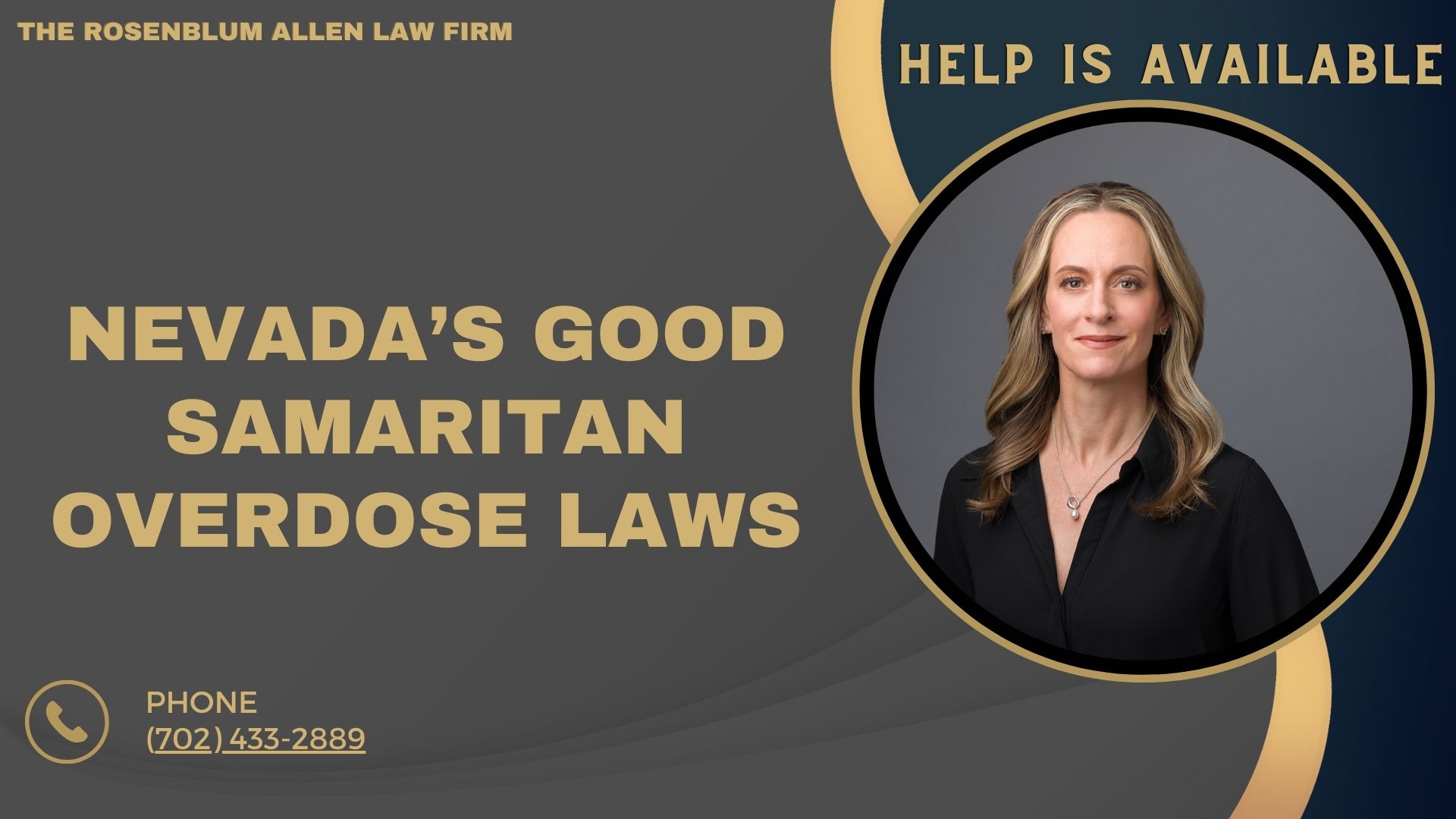The Good Samaritan Overdose Law in Nevada is a vital piece of legislation aimed at saving lives during overdose emergencies. By offering legal protection to those who seek help during an overdose, this law encourages timely intervention, reduces the fear of legal consequences, and helps prevent tragic deaths. Understanding the provisions of this law can make all the difference in an emergency, so Nevada residents need to be informed about its key features and protections.

 What is the Good Samaritan Overdose Law in Nevada?
What is the Good Samaritan Overdose Law in Nevada?
The Good Samaritan Overdose Law in Nevada is designed to encourage individuals to call for help during a drug overdose without fear of being arrested for drug-related offenses. This law provides immunity from prosecution for minor drug crimes when seeking medical assistance for someone experiencing an overdose. It serves to prioritize life-saving actions over the potential for legal consequences.
Purpose and Scope of the Law
The primary goal of this law is to address the opioid crisis and other drug-related emergencies by eliminating the barriers that may prevent people from contacting emergency services. Without the law, individuals who are present during an overdose might fear legal repercussions for drug possession or use, leading them to hesitate in calling 911 or seeking help.
This law applies to the following:
- Individuals who experience an overdose.
- Individuals who call 911 or seek help from medical professionals during an overdose emergency.
- People who witness an overdose and intervene to save someone’s life by providing aid or calling for help.
Key Provisions of the Law
The Good Samaritan Overdose Law in Nevada grants specific legal protections in the event of an overdose emergency. Here are the key provisions:
- Immunity from Prosecution: Those seeking help during an overdose, whether they are the person experiencing it or a bystander, will not face prosecution for drug possession or use.
- Limited Scope of Immunity: Immunity applies only to specific drug offenses, such as simple possession. It does not extend to serious crimes like drug trafficking or other violent offenses.
- Protection for Both the Overdose Victim and the Rescuer: Both the individual suffering from the overdose and the person who calls for help are protected from prosecution under the law.
Key Features of the Law
Immunity from Prosecution for Drug-Related Offenses
One of the most critical aspects of the Good Samaritan Overdose Law is the immunity it offers to individuals who seek help during an overdose. This protection covers minor drug offenses, such as possession of small amounts of controlled substances, which might otherwise lead to arrests or charges.
- For the Overdose Victim: The person who overdoses is protected from charges related to their drug use. For example, if they are found in possession of illegal drugs, they cannot be prosecuted for that possession as long as someone calls 911 or seeks medical help.
- For the Person Seeking Help: The person who calls 911 or provides assistance to the overdose victim is also granted immunity from prosecution for minor drug offenses they might have committed. This ensures that rescuers can act without fear of arrest.
How Immunity Applies to Both the Person Experiencing the Overdose and the Person Seeking Help
The law is designed to protect both parties involved in an overdose situation. It eliminates the fear of legal consequences, encouraging individuals to seek emergency help immediately.
- Overdose Victim: If you are experiencing an overdose and someone calls for medical help on your behalf, you will not face prosecution for any drugs found on you.
- Bystanders/Rescuers: If you witness an overdose and take action by calling emergency services or providing first aid, you are also protected from prosecution for minor drug offenses.
Specific Scenarios in Which the Law Applies
The Good Samaritan Overdose Law applies specifically to situations where a person overdoses on drugs or alcohol and someone seeks medical help. It covers scenarios like:
- Calling 911 for emergency medical assistance.
- Staying with the victim until help arrives.
- Administering first aid or other life-saving interventions while waiting for professionals to arrive.
In these scenarios, the law ensures that those involved will not face legal consequences for minor drug offenses. However, it’s important to note that this immunity does not apply to other illegal activities, such as drug trafficking or distribution.
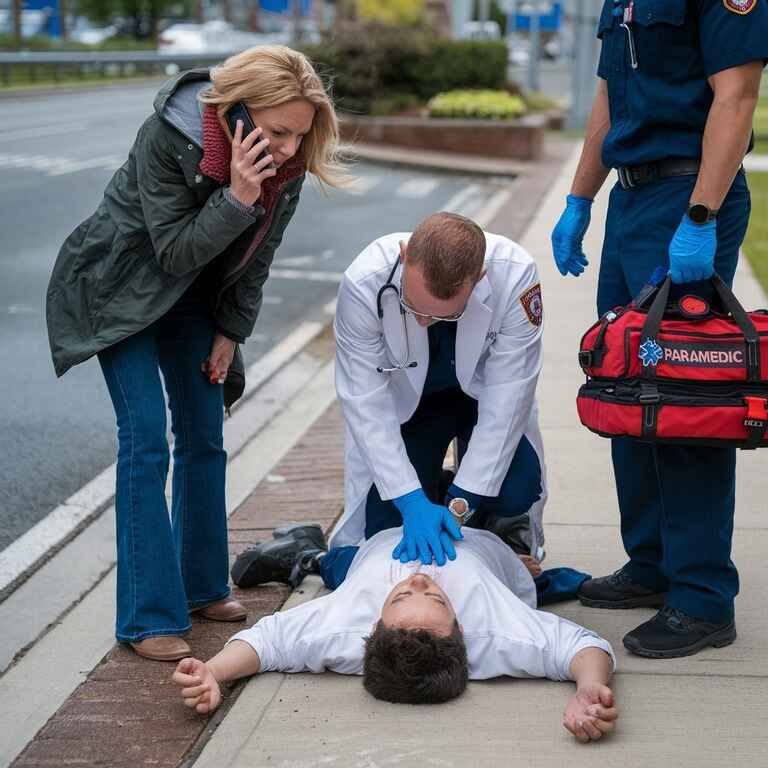
Who is Protected Under the Good Samaritan Overdose Law?
The Good Samaritan Overdose Law offers crucial protections, but whom does it cover? The law primarily focuses on two groups of people: the person experiencing the overdose and the person who seeks help. Let’s break it down.
Individuals Who Call 911 or Seek Medical Assistance During an Overdose
The law’s goal is to remove the hesitation that many people feel in calling for help during an overdose. Whether you’re the one who overdosed or a bystander, if you take action by calling emergency services, you are protected.
- For the overdose victim: If you’re the one suffering, the law ensures you won’t be charged for possessing drugs when help arrives.
- For the rescuer: If you’re the person calling 911, you will not be arrested for minor drug offenses, even if you have drugs on you.
Protection for Bystanders and Individuals Involved in Providing Aid
What if you’re just a witness? The law still has your back. You’re covered if you’re nearby and help by staying with the victim or providing assistance until help arrives.
- Immunity for bystanders: Whether you’re offering first aid or just ensuring the overdose victim doesn’t feel alone, you are also protected from prosecution.
In short, if you act with good intentions in an overdose situation, Nevada law gives you the legal protections to do so without the fear of getting into trouble.
Who Does Not Receive Immunity Under the Law?
While the law offers broad protection, it’s not a free pass for all behavior. Immunity only covers certain drug-related offenses. Here’s where it doesn’t apply:
- Drug trafficking: If you’re caught trafficking drugs, this law does not protect you.
- Violent crimes: The law does not offer protection for violent crimes or crimes involving serious harm to others.
So, if you’re involved in more serious criminal activity, like selling or distributing drugs, the law will not protect you. But you’re covered for the average person simply trying to help in an emergency.
What are the legal consequences of violating the law?
While the Good Samaritan Overdose Law offers legal immunity to people in emergency overdose situations, what happens if someone chooses not to seek help or fails to act?
Potential Penalties for Not Seeking Help During an Overdose
It’s important to remember that Nevada law encourages individuals to seek help during an overdose. Failing to act could lead to legal consequences.
- Failure to act: If you witness an overdose and do nothing, you might face consequences for not assisting the person in need.
- Negligence: Not calling 911 when you have the opportunity could be considered negligent behavior, especially if you have the means to save someone’s life.
If you don’t take action, you risk legal liability. The key takeaway is that Nevada law encourages life-saving actions, not punishing people for doing the right thing.
Legal Ramifications of Ignoring the Law
Ignoring an overdose emergency could lead to:
- Criminal charges: In some cases, a failure to help can lead to criminal charges for negligence.
- Civil lawsuits: You could also face civil lawsuits if your inaction leads to harm.
However, it’s important to emphasize that these penalties are typically reserved for situations where you willfully choose not to intervene. Simply witnessing an overdose without intervening isn’t a crime unless you have a legal duty to act.
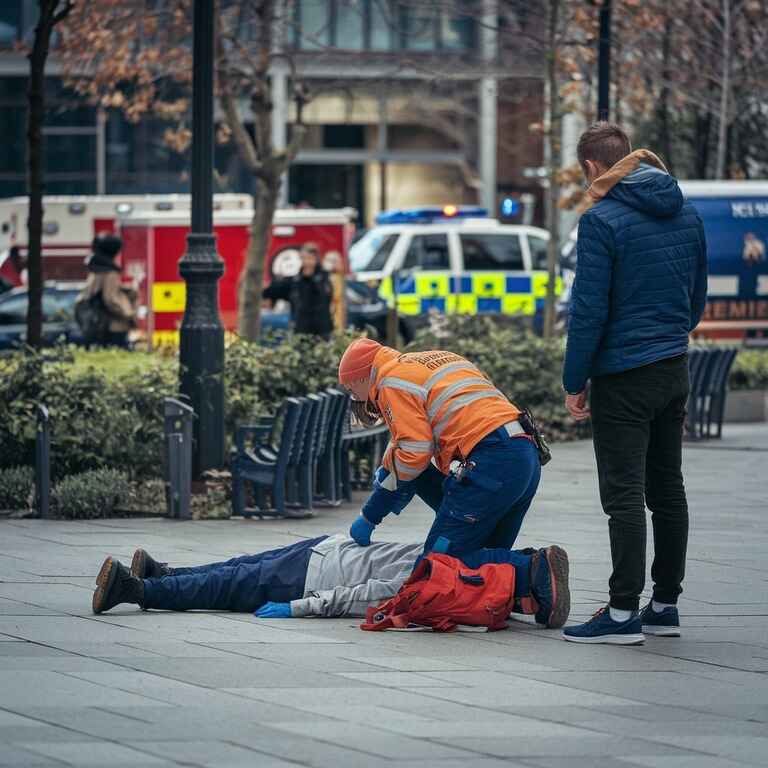
How Does the Law Encourage People to Act in Overdose Emergencies?
One of the most powerful aspects of the Good Samaritan Overdose Law is its ability to remove the fear of legal consequences. This fear often prevents people from seeking help in a crisis.
Reducing the Fear of Criminal Prosecution to Encourage Timely Help
When someone overdoses, every second counts. The law helps ensure that fear of arrest doesn’t delay action. People are more likely to call 911 or intervene when they know they’re protected from criminal charges for minor drug offenses.
For example, imagine you’re with a friend who overdoses, but you’re both in possession of illegal substances. Before the Good Samaritan law, you might hesitate to call for help, fearing legal trouble. You’re more likely to act with the law, knowing you’ll be protected.
The Role of the Law in Saving Lives by Promoting Faster Responses
In overdose situations, especially with substances like opioids, quick intervention can save lives. The Good Samaritan Overdose Law directly contributes to faster response times. When people feel safe calling 911, emergency services can arrive sooner, increasing the chance of survival for the victim.
A study of overdose incidents in Nevada has shown that the law has led to more calls for help and fewer overdose deaths. The law works—it’s saving lives.
Statistics or Case Studies Demonstrating the Law’s Impact on Overdose Situations
A 2021 report from the Nevada Department of Health revealed that overdose-related deaths decreased by 15% in the years following the enactment of the Good Samaritan Overdose Law. This reduction is attributed to more individuals seeking help without fear of legal repercussions.
In another case, a Las Vegas resident who witnessed a friend’s overdose immediately called 911, leading to the quick administration of Narcan, which reversed the overdose. Had the law not been in place, the witness might have feared arrest and delayed seeking help.
The data is precise: the law encourages timely intervention, which leads to better outcomes for those experiencing an overdose.
Limitations of the Good Samaritan Overdose Law
While the Good Samaritan Overdose Law in Nevada provides crucial protections, it is not all-encompassing. Understanding the limitations is essential to know when the law does not apply. These limitations help define the scope of the law and ensure it is used appropriately.
Situations Where Immunity May Not Apply
Although the law offers legal immunity in overdose emergencies, there are some situations where immunity does not extend. These are cases where serious crimes or activities unrelated to the overdose occur.
- Drug trafficking or distribution: If the person seeking help or the overdose victim is involved in selling or distributing drugs, immunity will not protect them. The law does not shield people from prosecution for criminal enterprise.
- Violent crimes: If someone is involved in violent activities during the overdose situation, such as assault or robbery, immunity does not apply to those actions.
- Other illegal activities: If you’re involved in a crime that’s not related to drug use or possession (such as theft or assault), immunity will not protect you. The law focuses on encouraging people to seek help for overdose situations, not for other criminal behavior.
Clarification of When Legal Immunity Does Not Extend
In practical terms, this means that while the law protects those who are directly involved in seeking help during an overdose, it doesn’t extend to those engaging in serious criminal activity.
For example:
- If a person is caught possessing drugs while trying to help someone who has overdosed, they are protected from possession charges.
- However, if they are caught selling drugs or using violence in the process, the law will not prevent prosecution for those more serious crimes.
In these cases, Nevada law clearly states that protections are limited to minor drug offenses, not major criminal activity.
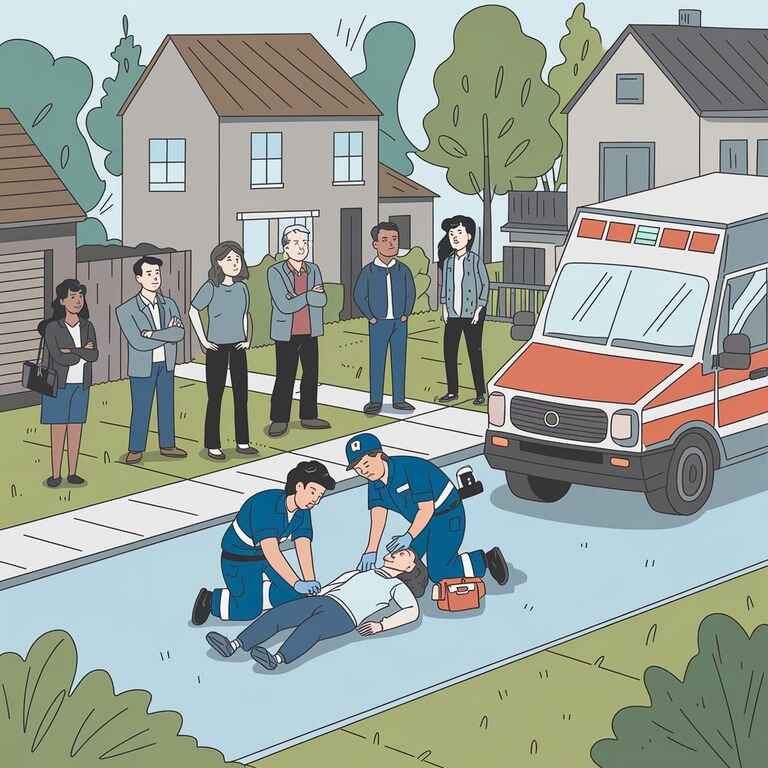
Steps to Take in Overdose Situations
In an overdose emergency, knowing what to do could save someone’s life. The Good Samaritan Overdose Law encourages action by offering protection. But what are the steps to take when someone is overdosing?
Best Practices for Individuals Who Witness an Overdose
Here’s what you should do if you witness an overdose:
- Call 911 immediately: Don’t wait to see if the person will recover. Dialing emergency services is the most crucial step. Emergency responders have the tools and training to save a life.
- Stay with the person: Don’t leave the victim alone. Stay with them and try to keep them calm. If they’re conscious, reassure them that help is on the way.
- Administer first aid: If you’re trained in first aid or CPR, do what you can to help. Administering Narcan (naloxone) can reverse opioid overdoses and save a life until emergency responders arrive.
- Follow the dispatcher’s instructions: When you call 911, the dispatcher will guide you through the next steps. Listen carefully and follow their instructions, especially if they provide you with CPR or first aid guidance.
How to Respond Effectively While Ensuring Legal Protection
Acting quickly and correctly can protect both the victim and the person trying to help. Here are a few key tips to ensure you’re acting in line with the law:
- Be honest about what happened: When speaking with emergency responders, tell them precisely what you know. This helps them provide the best care and can also help avoid any confusion about the situation.
- Don’t worry about getting into trouble: The law protects you from minor drug offenses, so focus on the person in need and don’t worry about legal issues. Your priority should be helping.
- Don’t leave the scene: If you leave the overdose victim before help arrives, you may risk the situation worsening. Stick around until emergency responders arrive.
Understanding the Importance of Contacting Emergency Services Immediately
Time is critical in overdose situations, especially when opioids are involved—every minute counts. Delaying help can reduce the chances of survival. According to experts, the longer an overdose goes untreated, the greater the risk of permanent damage or death.
By calling 911 immediately and staying with the victim, you’re giving them the best chance for survival.
Common Misconceptions About the Good Samaritan Overdose Law
The Good Samaritan Overdose Law is an essential tool in saving lives, but many misconceptions might prevent people from fully understanding its protections. Let’s clear up some of the most common myths.
Debunking Myths About the Law’s Coverage
There’s a lot of confusion about what this law protects. Here are some myths and the truth behind them:
- Myth 1: The law protects me from all drug-related charges.
- Truth: The law only protects you from charges related to minor drug offenses, like possession. It does not cover grave crimes, such as drug trafficking or violent crimes.
- Myth 2: I have to be directly involved in the overdose to be protected.
- Truth: Not true! Even if you’re just a bystander or witness, you are protected by the law if you seek help or stay with the victim.
- Myth 3: I can’t be charged for drug-related crimes if I’m the overdose victim.
- Truth: While the law protects you from minor possession charges, it doesn’t protect you from more serious charges, such as trafficking or if you’re caught with large quantities of drugs.
Clarifying Misunderstandings About the Law’s Application and Scope
Some people might think they can avoid prosecution for anything just because they’re seeking help during an overdose. However, this is not the case. Here’s a quick rundown:
- The law protects those seeking help, but only for minor drug offenses. If you’re caught doing something serious (like selling drugs), you’re still subject to arrest and prosecution.
- The law encourages people to help others without fear of criminal charges, but it doesn’t protect those who are involved in drug trafficking or violent crimes. You’ll face the consequences if you’re actively engaged in criminal activity.
Understanding these nuances is key to ensuring that you can act with confidence during an overdose emergency.
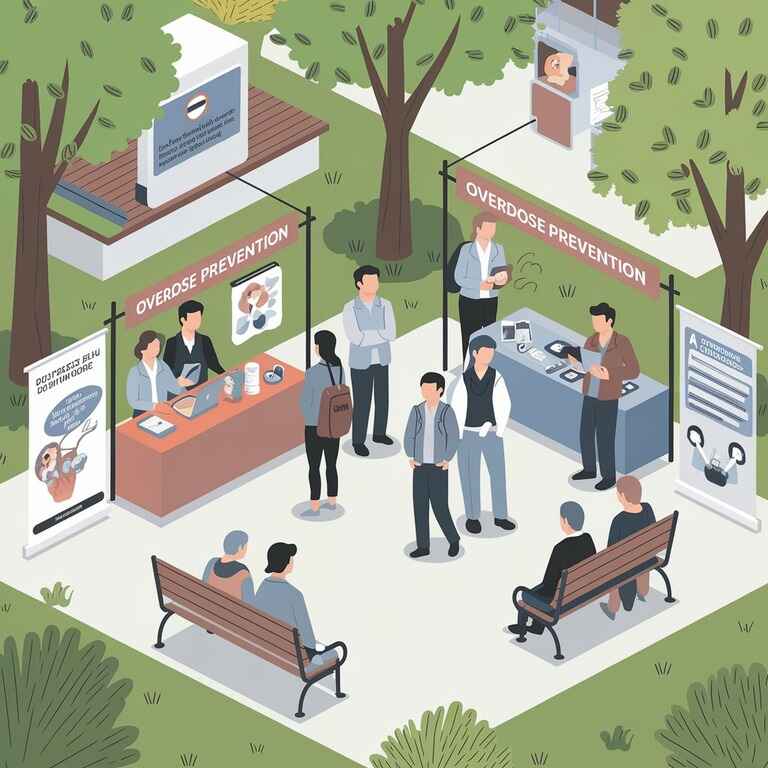
The Role of the Law in Public Health and Safety
The Good Samaritan Overdose Law is more than just a legal provision—it’s a critical tool in the broader fight against overdose deaths and the public health crisis surrounding drug use. By protecting people who seek help during an overdose, this law plays a key role in both saving lives and promoting a healthier, more supportive community.
How the Law Fits into Broader Public Health Efforts to Combat Overdose Deaths
In Nevada, as in many other states, the opioid epidemic and other drug-related emergencies are serious concerns. The Good Samaritan Overdose Law is part of a larger harm reduction strategy that seeks to reduce the number of overdose fatalities. It encourages people to take action in a crisis without worrying about legal consequences.
This law works hand in hand with other public health initiatives like:
- Access to naloxone (Narcan): A medication that can reverse opioid overdoses, Narcan is often distributed to at-risk individuals and families, giving them a tool to save lives until help arrives.
- Education and outreach programs: These programs aim to educate people about the dangers of overdose and the importance of getting help when someone is at risk. The Good Samaritan law helps amplify the message that seeking help is the right choice.
Together, these efforts aim to reduce the number of drug-related deaths in Nevada by empowering individuals to act quickly and without hesitation.
The Impact of the Law on Reducing Stigma Around Drug Use and Overdose Situations
Drug use is often surrounded by stigma and shame, which can discourage people from reaching out for help during an overdose. The Good Samaritan Overdose Law seeks to reduce this stigma by emphasizing that the priority should always be saving lives, not punishing people for their drug use.
- Shifting the focus: Instead of viewing those involved in overdose situations as criminals, the law frames them as individuals in need of assistance, deserving of care and protection.
- Encouraging community support: By removing the fear of legal consequences, the law creates an environment where people feel more comfortable helping each other in emergencies.
This shift in perspective helps create a more compassionate and supportive community. It allows people to act in the best interest of others without the fear of judgment or punishment.
How the Law Aligns with Harm Reduction Strategies in Nevada
Harm reduction is a set of public health strategies aimed at reducing the negative consequences of drug use. The Good Samaritan Overdose Law is a key component of Nevada’s harm reduction efforts, as it encourages individuals to seek help during a crisis.
Some other harm reduction strategies in Nevada include:
- Needle exchange programs: These programs provide clean syringes to drug users to prevent the spread of infections like HIV and hepatitis.
- Safe consumption spaces: Some areas offer supervised environments where individuals can use substances safely, with medical staff on hand in case of an overdose.
- Addiction treatment and counseling: Programs that offer rehabilitation services help individuals manage addiction and prevent future overdose situations.
The law complements these strategies by removing one of the major barriers to getting help—the fear of legal consequences—and reinforcing the importance of life-saving action in times of crisis.

Breaking It All Down
The Good Samaritan Overdose Law in Nevada is an essential legislation for saving lives. By offering legal protection to individuals who seek help during an overdose, the law encourages timely action and helps reduce the number of overdose deaths in the state. It is a vital tool in the broader effort to combat the opioid epidemic and other drug-related crises.
The law helps shift the focus from punishment to care and compassion, making it easier for people to act when needed. Whether you are the person experiencing the overdose or a bystander offering assistance, the law ensures that you can get help without fear of legal repercussions for minor drug offenses.

What is the Good Samaritan Overdose Law in Nevada?
The Good Samaritan Overdose Law in Nevada protects individuals who seek medical help for someone experiencing an overdose. It offers legal immunity to both the person who calls 911 and the overdose victim for minor drug-related offenses, such as possession. This law aims to encourage quick action in overdose emergencies without the fear of arrest.
Who is protected under the Good Samaritan Overdose Law?
The law protects two main groups:
- The overdose victim: The person experiencing the overdose is protected from arrest or prosecution for drug possession.
The person who calls 911: Anyone who seeks medical help during an overdose is protected from minor drug charges, even if they have drugs on them.
Does the law cover all drug-related crimes?
No, the law does not protect individuals from serious drug-related offenses. For example, if someone is caught trafficking or distributing drugs during an overdose emergency, they are not immune from prosecution. The law only protects against minor drug offenses, such as possession.
Can I be arrested if I witness an overdose and don't call 911?
While the Good Samaritan Overdose Law encourages people to call 911 in overdose situations, failing to act is not a criminal offense under this law. However, if you do nothing, you could face civil liability if your inaction contributes to harm. It’s always best to act quickly and call for help.
Does the law apply if I'm not directly involved in the overdose but witness it?
Yes, the law extends to bystanders. If you witness an overdose and call 911 or stay with the victim until help arrives, you are protected from minor drug charges. The law is designed to encourage people to help without fearing legal consequences.
How does the Good Samaritan Overdose Law affect public health in Nevada?
The law is part of a more significant public health effort to combat overdose deaths. By protecting those who seek help, it encourages quicker action in emergencies, which can save lives. It also reduces the stigma around drug use and overdose situations, creating a safer, more supportive community for those affected by substance use disorders.
Does the Good Samaritan Overdose Law protect me from being charged if I have large quantities of drugs on me?
No, the law does not protect you if you are caught with large amounts of drugs, especially if you are involved in drug trafficking. The law only offers protection from minor drug offenses like possession, not from more serious criminal activities.
If I administer Narcan to someone, am I protected by the Good Samaritan Overdose Law?
Yes, if you administer Narcan (naloxone) or any other first aid in an overdose situation, you are protected under the law. The law encourages people to act quickly and help save lives without fear of legal repercussions.
How do I know if I'm eligible for protection under this law?
You are eligible for protection if:
- You call 911 during an overdose emergency, or
- You are the overdose victim seeking medical help. You will be protected from minor drug charges if your actions are aimed at helping the victim and not engaging in more serious criminal behavior.
Can I be charged if I leave the scene before help arrives?
If you leave the scene during an overdose emergency, you could face some legal risks. It’s always best to stay with the person needing help until medical responders arrive. Leaving might hinder the chances of saving a life and could expose you to potential legal consequences.
What should I do if I'm involved in an overdose situation?
If you’re involved in an overdose emergency, follow these steps:
- Call 911 immediately: Time is critical, and emergency responders must arrive immediately.
- Stay with the person: Don’t leave them alone. Offer reassurance and keep them calm.
- Administer Narcan if available: If you have access to Narcan, use it to reverse an opioid overdose while waiting for help.
Follow the dispatcher’s instructions: The 911 dispatcher may guide you on assisting the victim.
Frequently Asked Questions

Additional Resources for You from The Rosenblum Allen Law Firm.
At The Rosenblum Allen Law Firm, we provide comprehensive legal services beyond surrogacy. Below are some additional resources that may be helpful, with embedded links for your convenience:
Criminal Defense Attorney: If you are facing criminal charges, our experienced defense team is here to protect your rights and fight for the best possible outcome.
Las Vegas DUI Lawyer: We help individuals accused of DUI offenses navigate the legal process, minimize penalties, and protect their driving privileges.
Domestic Violence Lawyer Las Vegas: If you are dealing with allegations of domestic violence, we offer compassionate representation to help you through these challenging situations.
Drug Possession Lawyer: Whether you’re facing misdemeanor or felony drug charges, we provide aggressive legal defense to safeguard your future.
Sex Crimes Attorney: Our firm offers discreet, skilled representation for those accused of sensitive sex crime cases, ensuring that your rights are protected.
CPS Defense Attorney: If you are facing allegations of child abuse or neglect, we are here to protect your parental rights and guide you through the CPS process.
Misdemeanor Lawyer: For minor offenses, our team helps clients resolve their cases efficiently and minimize long-term consequences.
Las Vegas Warrant Defense Attorney: If you have an active warrant, we can help you address it before it escalates to an arrest.
Las Vegas Probation Violation Attorney: If you’ve been accused of violating probation, we’ll work to defend you and reduce potential penalties.
Theft Crime Defense Lawyer: Whether you’re facing shoplifting or more serious theft charges, our firm is prepared to defend your case.
Kidnapping Lawyers: If you’re dealing with kidnapping charges, we’ll provide strategic legal support tailored to your situation.
Juvenile Defense Lawyers: Our firm is dedicated to protecting the rights of juveniles and helping them navigate the justice system.
Firearms Lawyer Las Vegas: We assist clients accused of firearm-related offenses, ensuring their rights are preserved and their cases are handled effectively.
Let us know how we can help. At The Rosenblum Allen Law Firm, your case is our priority. Feel free to reach out to us for assistance or consultation!

Offsite Resources for You
Here are seven offsite resources related to the Good Samaritan Overdose Law in Nevada and overdose prevention that readers may find useful:
Nevada Department of Health and Human Services (DHHS)
Nevada DHHS provides information on public health programs, including initiatives to combat substance abuse and overdose in Nevada.Substance Abuse and Mental Health Services Administration (SAMHSA)
SAMHSA offers resources on substance use prevention, treatment, and harm reduction, including a treatment locator and educational materials.Centers for Disease Control and Prevention (CDC)
CDC has extensive resources on drug overdose prevention, including data and recommendations for communities tackling the opioid crisis.Drug Policy Alliance
Drug Policy Alliance focuses on harm reduction strategies, drug policy reform, and overdose prevention efforts across the United States.Overdose Lifeline
Overdose Lifeline is a nonprofit organization providing resources, education, and tools for individuals and communities working to prevent overdoses.National Harm Reduction Coalition
National Harm Reduction Coalition is dedicated to improving public health through harm reduction strategies, offering training, resources, and advocacy efforts.Partnership to End Addiction
Partnership to End Addiction offers support and resources for families and individuals dealing with substance use issues, including overdose prevention information.
These organizations provide valuable tools, education, and assistance for those affected by substance use and overdose emergencies.

A Special Message from Our Lead Attorney, Molly Rosenblum Allen, Esq

Thank you for taking the time to explore these resources and learn more about this critical topic. If you have questions or need assistance navigating your legal situation, my team and I at The Rosenblum Allen Law Firm are here to help. Don’t wait—call us at (702) 433-2889 to get the ball rolling on your case. We’re ready to guide you every step of the way.

